

World
politics
UN official says it could take 14 years to clear rubble from Gaza

The extensive amount of rubble left by Israel’s devastating war in the Gaza Strip could take about 14 years to remove, a UN official said on Friday.
Pehr Lodhammar, an official with the United Nations Mine Action Service, told a briefing in Geneva that the war had left an estimated 37 million tons of debris in the densely populated territory.
According to the media office in Gaza, Israeli attacks have destroyed as many as 70,000 houses, and damaged 290,000 others, rendering them uninhabitable. The structures hit also include government buildings, hospitals, schools, mosques, churches, and historical sites.
Israel has pounded the Gaza Strip since a cross-border attack by Hamas on Oct. 7, 2023 which killed some 1,200 people.
Besides killing more than 34,000 Palestinians since then, the Israeli military campaign has turned much of the enclave of 2.3 million people into ruins, leaving most civilians homeless, hungry, and at risk of disease.
US has seen evidence of China trying to interfere in upcoming US elections: Blinken

BEIJING – US Secretary of State Antony Blinken said the US has seen evidence of Chinese attempts to “influence and arguably interfere” with the upcoming US elections, despite an earlier commitment from leader Xi Jinping not to do so.
Blinken made the comments to CNN’s Kylie Atwood in an interview Friday at the close of a three-day to trip to China, where the top American diplomat spent hours meeting with top Chinese officials including Xi, as the two countries navigated a raft of contentious issues from US tech controls to Beijing’s support for Moscow.
Blinken said he repeated a message President Joe Biden gave to Xi during their summit in San Francisco last November not to interfere in the 2024 US presidential elections. Then, Xi had pledged that that China would not do so, according to CNN reporting.
“We have seen, generally speaking, evidence of attempts to influence and arguably interfere, and we want to make sure that that’s cut off as quickly as possible,” Blinken said when asked whether China was violating Xi’s commitment to Biden so far.
“Any interference by China in our election is something that we’re looking very carefully at and is totally unacceptable to us, so I wanted to make sure that they heard that message again,” Blinken said, adding there was concern about China and other countries playing on existing social divisions in the US in influence campaigns.
Chinese President Xi Jinping on Friday told top US diplomat Antony Blinken that the world’s biggest economies should be “partners, not rivals” as the two sides pressed for headway on a range of concerns.
Blinken, in China for the second time in less than a year, pointed to improvements in the relationship.
Meeting Blinken in Beijing’s Great Hall of the People, Xi said the two countries had “made some positive progress” since he met with US President Joe Biden in November. “The two countries should be partners, not rivals,” Xi said. But he issued a warning over what China considers US pressure to curb its economy, which have included a sweeping ban on semiconductor exports and efforts to wrest blockbuster app TikTok from its Chinese owners.
“We hope the US can also take a positive view of China’s development,” Xi said. “When this fundamental problem is solved,” he said, “relations can truly stabilise, get better and move forward”. Earlier China’s Foreign Minister Wang Yi warned Blinken that US pressure could trigger a “downward spiral”.
Wang also warned that the question of self-ruled Taiwan was the “first red line” that must not be crossed in China-US relations.
Blinken described his talks with Wang at the Diaoyutai state guesthouse — which lasted more than five and a half hours — “extensive and constructive”.
Elon Musk beats Mark Zuckerberg as richest man, again

Because of Meta’s most recent decline in market value, Elon Musk, the CEO of Tesla, has once again surpassed Mark Zuckerberg, the owner of Facebook, Instagram, WhatsApp and Threads.
Even though Facebook’s parent company posted better-than-expected first-quarter profitability, it nevertheless saw a $132.2 billion decline in market capitalisation on Thursday, according to Quartz.
Investors who were alarmed by the tech giant’s AI initiatives and muted second-quarter projections contributed to the loss. On Friday during regular trade, Meta’s worth decreased to $1.11 trillion.
As of Thursday, Musk’s net worth was $184 billion, based on Bloomberg’s Billionaire Index. According to the same index, Zuckerberg’s net worth has dropped significantly from the $175 billion that was estimated for him last week to $157 billion.
This occurred just a few days after Tesla released its disappointing earnings results, showing that its revenue growth rate had decreased by 9% year over year — the largest decrease since 2012. Musk assured investors that Tesla would soon start selling EVs at a lower price, so investors remained unfazed.
Even after the tech company revealed that its revenue was 30% greater than the previous year, Meta did not see the same level of investor trust.
Meta’s stock dropped 12% when the company released its earnings. Investors seemed fixated on Meta’s AI initiative and its dismal revenue forecast for the second quarter; the social media company estimated it would bring in between $36.5 billion and $39 billion.
China wants ‘just, lasting’ solution to Palestine issue

Chinese Foreign Minister Wang Yi called Thursday for an “early and lasting” solution to the ongoing Palestine issue.
Wang spoke during a meeting in Beijing with his Malaysian counterpart Mohamad Hasan, saying his country wants to work with Kuala Lumpur to promote an “early, comprehensive, just and lasting” solution to the simmering issue, the South China Morning Post reported.
Hasan, who wrapped up a three-day visit to China which started on Tuesday, said that Kuala Lumpur highly appreciates Beijing’s stance on the Israeli-Palestinian conflict.
Israel has launched a brutal offensive on the Gaza Strip since a cross-border attack by the Palestinian group Hamas on Oct. 7 last year, which Tel Aviv says killed nearly 1,200 people.
More than 34,300 Palestinians, mostly women and children, have since been killed, and nearly 77,300 others injured amid mass destruction and severe shortages of necessities.
More than six months into the Israeli war, vast areas of Gaza lay in ruins, pushing 85% of the enclave’s population into internal displacement amid a crippling blockade of food, clean water and medicine, according to the UN.
Israel stands accused of genocide at the International Court of Justice. An interim ruling in January ordered Tel Aviv to stop genocidal acts and take measures to guarantee that humanitarian assistance is provided to civilians in Gaza.
South China Sea
Malaysia’s top diplomat said his country opposes the meddling of “external forces” in the disputed South China Sea, adding the foreign interference is not welcomed in the region.
Malaysia is one of several countries with overlapping territorial claims in the South China Sea.
Wang praised Malaysia as “an important member” of the Association of Southeast Asian Nations (ASEAN), a “representative of emerging economies, and a positive and stable force in the Muslim world.”
He added that China would improve coordination with Malaysia and stand up and speak for the interests of the Global South on the international stage.
The two sides also discussed strengthening economic cooperation and exchanged views on international issues.
Hasan’s visit came as the US and the Philippines continue Balikatan 2024, an annual, two-week joint military exercise in the South China Sea, until May 8.
China has been Malaysia’s largest trade partner for the last 15 years. The annual trade volume between the two countries is over $98 billion.
Joe Biden makes Israel, Ukraine, TikTok bill into law
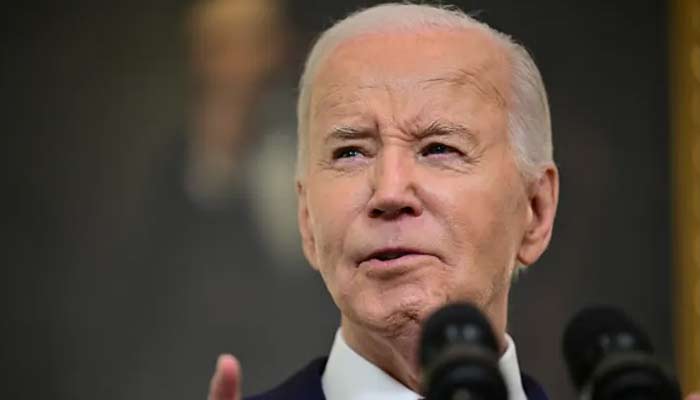
US President Joe Biden signed the law which will provide aid to Israel, Ukraine and Taiwan, along with making Chinese TikTok parent company ByteDance sell its social media platform.
A six-month upheaval of intense political wars on Capitol Hill leading to a deadlock on foreign aid has ended with Biden’s official approval, according to CNBC.
“The path to my desk was a difficult path. It should have been easier and it should’ve gotten there sooner,” Biden said Wednesday after signing the bill. “But in the end, we did what America always does, we rose to the moment.”
After the House passed the bill on Saturday, Biden had indicated his ambition to make it into a law.
Moreover, in an overwhelmingly bipartisan 79-18 vote the Senate gave its own greenlight late Tuesday night, and then sent it to the US President’s desk for his signature.
The law sets up roughly $60 billion in aid for Ukraine, $26 billion for Israel and $8 billion for security in Taiwan and the Indo-Pacific.
Additionally, It also requires ByteDance to sell TikTok within nine months or a year in case Biden invokes a 90-day extension, and if the Chinese company does not follow this, it will else face a nationwide ban in the US.
Notably, TikTok has already promised to fight this.
“This unconstitutional law is a TikTok ban, and we will challenge it in court,” the company wrote in a Wednesday statement on X following Biden’s signing.
“This ban would devastate seven million businesses and silence 170 million Americans,” it added.
Modi on fire after ‘Islamophobic’ remarks
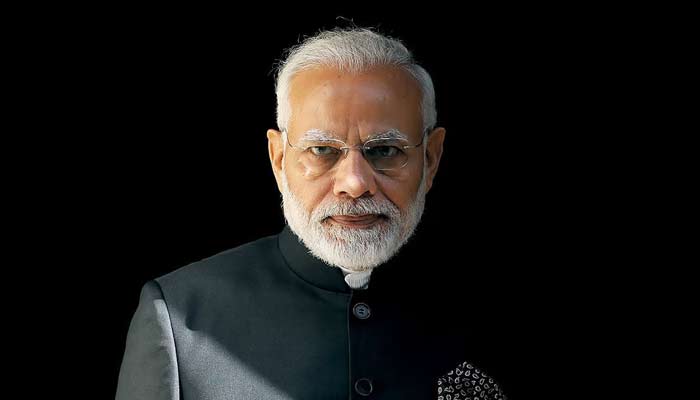
Indian Prime Minister Narendra Modi has been accused of Islamophobic remarks by the opposition after claiming that his rivals would give out people’s wealth to “infiltrators” if they took over power.
The opposition Congress wanted to distribute wealth to “those who have many children”, Modi told a rally, according to BBC.
His comments were broadly seen as referring to India’s Muslim minority.
On the other hand, the Congress party has rejected the claim, which came days after the general election started.
PM Modi’s Bharatiya Janata Party (BJP) government has often been accused of discriminating against India’s minority communities, especially Muslims.
This has been confirmed by the rights groups, who say that they face discrimination and attacks, and have been forced to live as “second-class” citizens under Modi’s rule. However, the BJP denies these allegations.
On 19 April, the first of seven phases in the general election was held. Notably, the results will be declared on 4 June.
During an election rally in Rajasthan state, Modi made the comments on Sunday, when he was talking about the Congress party’s manifesto.
He alleged that the manifesto said it would “take stock” of the gold that women traditionally save in India and redistribute it.
“And their earlier [Congress] government had said that Muslims have the first right over the nation’s wealth,” PM Modi alleged.
“This means that they [the Congress] will collect people’s wealth and distribute it to whom?” he asked the audience.
“To those who have more children. To the infiltrators. Should your hard-earned money be given to infiltrators?” he added referring to a 2006 speech by Manmohan Singh.
Economy (world)

PAKISTAN
Politics
PML-N opted for ‘power politics at all costs’, says Abbasi
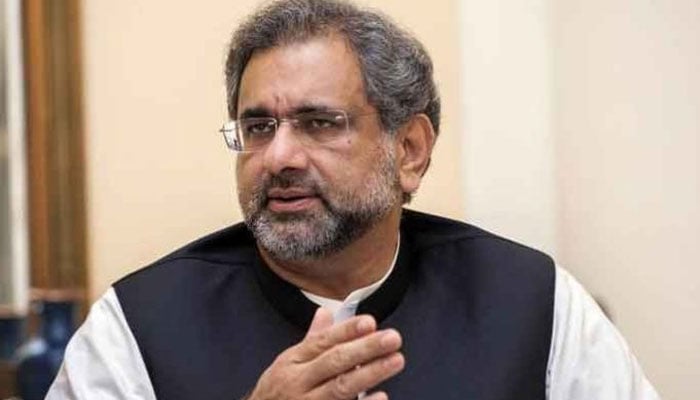
Former Pakistan Muslim League-Nawaz (PML-N) leader and ex-prime minister Shahid Khaqan Abbasi has said that he opposed the ruling party’s decision to choose “power politics at all costs”.
Speaking on Geo News programme “Jirga” aired on Saturday, Abbasi said: “PML-N chose politics of power at all costs.”
The former PML-N leader said that he did not agree with the politics that the PML-N had chosen in 2022. The ex-PM said that he was no more a member of the ruling party, adding that he had resigned from the party.
Abbasi had stepped down from the party office soon after the appointment of Maryam Nawaz as senior vice president and chief organiser last year.
Responding to a question, Abbasi said that he had informed the PML-N leadership a year ago that he would not contest the next election from the platform of the Sharifs’ party.
“I did not attend any PML-N meeting after tendering resignation from the party.”
To another query, Abbasi said that he was a member of the “Muslim League” even before the establishment of PML-N.
He claimed that he never approached the establishment.
“We contested the 2002 elections against the establishment,” he added.
Abbasi also expressed ignorance over reports that PML-N supremo Nawaz Sharif went abroad and then returned to the country under any deal.
Earlier this month, Abbasi, who served as the country’s prime minister from August 2017 to May 2018, approached the Election Commission of Pakistan (ECP) for the registration of a new political party.
The seasoned politician submitted relevant documents to the poll organising authority’s office for the registration of a new political party.
Speaking to reporters, Abbasi had said he provided relevant documents to the election commission for his new political party which would be registered under the Election Act 2017.
He had also announced that he would take part in next elections under the banner of his new party.
PTI seeking establishment’s help to return to power, claims Ranaullah Sanaullah
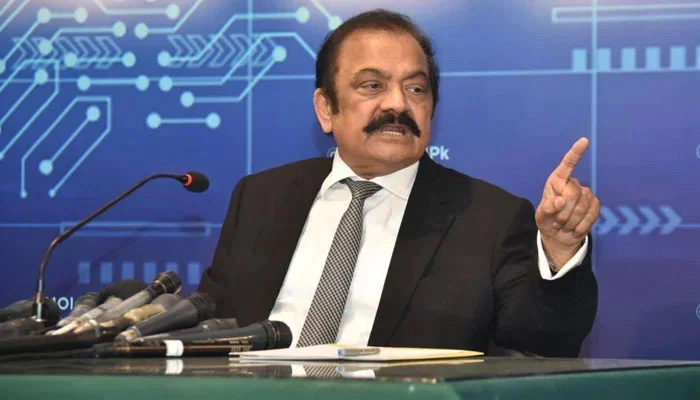
Responding to Pakistan Tehreek-e-Insaf (PTI) leader Shehryar Afridi’s statement on holding talks with top military brass, Pakistan Muslim League-Nawaz (PML-N) alleged that the Imran Khan-founded party looking to return to the power corridors via using “establishment as its weapon”.
“PTI’s ideology is not political,” Sanaullah alleged while speaking on Geo News programme Naya Pakistan on Saturday. He added that the PTI wanted to be “imposed” on the country with the establishment’s help.
He suggested that all disputes would be resolved if all political parties sit together and institutions worked within their constitutional ambit. The former interior minister said that nobody would object if the country achieved political stability though holding dialogue.
Criticising the PTI, Sanaullah said that the former ruling party was levelling all kind of allegations on the ruling PML-N but it was publically announcing to hold dialogues with the establishment.
He was pointing towards Afridi’s recent statement in which he hinted at holding dialogues with the army chief and the Director General Inter-Services Intelligence (DG ISI), instead of the “rejected rulers”.
However, the PTI did not second Afridi’s statement.
In the same programme, PTI Secretary Information Raoof Hasan said they constituted a committee more than a year and half ago for holding dialogue with the establishment.
“We are ready to hold talks with the establishment but no contact is made so far,” he added.
Hasan was of the view that his party would not enter into negotiations with the ruling parties, including PML-N, Pakistan Peoples Party (PPP), and Muttahida Qaumi Movement-Pakistan (MQM-P), as they “stole our mandate”.
He rejected Sanaullah’s allegation questioning PTI’s political ideology and said that the Imran Khan-founded party formed a six-party alliance which showed it is ready to hold talks with all political parties.
He clarified that Afridi’s statement did not represent his party’s stance. “We want to hold talks with the establishment to tell its constitutional role,” Hasan said, adding that PTI founder Imran Khan would not stay behind bars for nine months if he wanted to strike a deal with the current rulers.
Afridi’s explosive statement
After calls were made to initiate a new round of reconciliation talks, PTI senior leader Shehryar Afridi on Friday claimed that his party will hold “dialogues with the Chief of Army Staff (COAS) and the Director General of the Inter-Services Intelligence (DG ISI) soon” instead of talking to “rejected people” who reached the parliament via “Form 47”.
Afridi made the statement while speaking on the Geo News programme Naya Pakistan when sought his opinion about ways to put the country on the path of political stability.
“My leader doesn’t want any NRO. We want dialogues for the betterment of Pakistan,” Afridi said, adding that Khan wants to engage all stakeholders for a better country but he did not receive any response. He clarified that the PTI was neither going against the national interests nor the military and other state institutions.
The former federal minister also claimed that the Imran-founded party would soon hold talks with the army chief and the top spy chief, however, he did not disclose any further details nor any other party leader seconded his statement so far.
Complete independence sans economic stability impossible: COAS
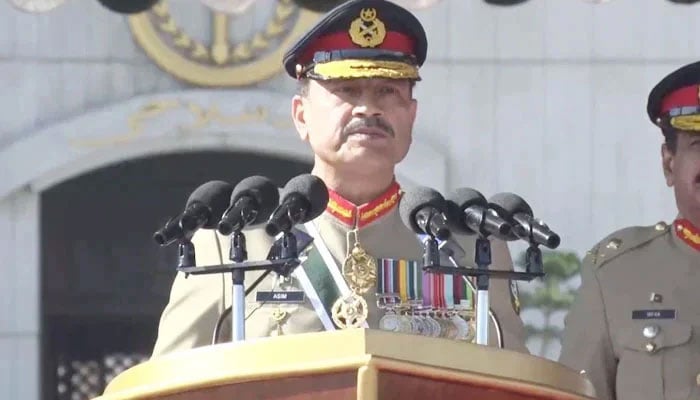
Chief of Army Staff (COAS), General Syed Asim Munir has said that complete independence without economic stability is not possible.
Addressing the Green Pakistan Initiative conference on Friday, the army chief urged the nation to reject “negative forces” together. He said that negative propaganda and social media trolls could not distract the nation from marching towards the development and prosperity of Pakistan.
“Let us all reject negative forces together and focus on Pakistan’s journey of development and stability.”
He said that the armed forces of the country with the support of the nation would fail all the inimical forces bent on impeding the country’s development and prosperity.
“We are all a united team Pakistan – InshaAllah with the cooperation and support of the people, all efforts of those who distract and obstruct Pakistan’s development journey will fail,” he added.
“No instability would be tolerated in Pakistan’s journey of prosperity and development,” the army chief warned.
The army chief also stressed the need for national unity to put the country on the path of progress and development. “The Pakistan Army will continue to provide all possible assistance [to government] for the economic development of Pakistan.”
Last month, COAS Munir assured the unwavering resolve of the Pakistan Army to support the government’s initiatives aimed at the economic recovery of the country.
He had made the remarks during a high-level meeting — with an agenda of “measures against the spectrum of illegal activities and criminal mafias” — held with Prime Minister Shehbaz Sharif in the chair. The meeting was attended by civil-military leadership in which measures against unlawful activities were discussed.
The civil-military leadership had decided strict actions against those elements who were involved in any kind of illegal activities including corruption, smuggling power theft or running criminal mafias.
No ‘unseen power’ stopped Nawaz from becoming PM, says Irfan Siddiqui
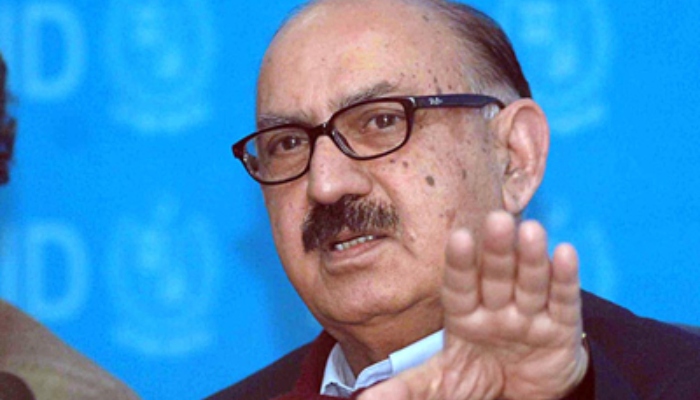
ISLAMABAD: Senator Irfan Siddiqui Friday said Prime Minister Shehbaz Sharif or “an unseen power” did not create a hurdle in Pakistan Muslim League-Nawaz (PML-N) supremo Nawaz Sharif’s path to become the prime minister for a fourth time.
It was a baseless impression that Nawaz’s path to the PM’s office was blocked by the party president or an “unseen power”, the senior PML-N leader said talking with Geo News programme ‘Geo Pakistan’
Siddiqui said during his meetings with Nawaz before the February 8 general elections, he had the impression that Nawaz did not want to become the PM again.
The senator said it was speculated in the media that Nawaz was dying to become the premier again.
“I was present in the meeting where Nawaz Sharif announced to give the premiership to Shehbaz Sharif. Even if Nawaz had even 1% desire to become PM is there any power that could stop him from becoming the PM?” he asked.
PML-N President Shehbaz became the country’s prime minister for the second time following the party’s nomination after Nawaz decided against running for the coveted post after returning to the country following a four-year self-imposed exile from London.
The party, which had longed for the veteran politician’s return, had formulated its election campaign around the politico pitching him as a saviour who could address the country’s prevailing crises and lead it towards prosperity.
However, following the February 8 polls, which saw major political parties including the PML-N, the Pakistan Tehreek-e-Insaf-backed independent candidates and the Pakistan Peoples Party (PPP) failing to secure a simple majority in the National Assembly, the PML-N nominated Shehbaz as its prime ministerial candidate.
The move, it seemed, reflected Nawaz’s reluctance to lead a weak coalition government which can at least be termed as a rather uphill task in light of the prevailing economic crises that have gripped the country for some time.
The development had received mixed reactions from various circles with some claiming that the veteran politician’s career was “over”.
To a query, Senator Siddiqui said he was not denying that PML-N stalwart Rana Sanaullah must have assumed that if there was a two-thirds majority then Nawaz would become the prime minister.
“If Nawaz Sharif is not on the prime minister’s chair, is it not the PML-N or Nawaz Sharif’s government? It is PML-N and Nawaz Sharif’s government (in the power),” he said adding that there was no conspiracy against Nawaz in the party.
He said it would have been a conspiracy if Nawaz had been yearning to come into power and could not have succeeded.
On April 18, Siddiqui had revealed that Nawaz still gave his input on various matters including but not limited to the federal cabinet, economic recovery and others.
Speaking to Geo News, the senator had revealed that there was a section within the PML-N that believed that the party needed a full-time president and therefore, he had added, there a possibility was there that Nawaz would once again secure the party’s top post.
There was an opinion in the party that political posts should be separated from government ones. Whoever had a ministry was paying attention to it, and the party was being ignored, he had said.
Highlighting that Shehbaz did not have enough time to run the party as he was occupied with fulfilling his responsibilities as the PM for the country’s economic recovery, Siddiqui had said that the decision with regards to the party’s presidency would be made in a few months.
Lamenting the dire economic circumstances when the PML-N-led Pakistan Democratic Movement (PDM) government came into power, the politician had lauded Shehbaz for saving the country from defaulting amid grim economic indicators.
CM Maryam can ‘wear’ uniform as per Punjab Police Dress Regulations

LAHORE: Punjab Chief Minister Maryam Nawaz showed up at a police passing-out parade event wearing the police uniform, garnering both appreciation and criticism for the move with many also claiming that she was not entitled to don the law enforcement agency’s uniform.
However, disregarding the claim, the Punjab Police has issued a statement assuring that the chief minister is, in fact, “entitled” to wear it as per the Punjab Police Dress Regulations.
Dressed in the khaki shirt, bottoms, a hat on her head and a police baton in tow, the chief minister inspected a passing-out parade of lady constables and traffic assistants at the Police Training College, Chung, while wearing a police uniform.
This move by the chief minister not only garnered appreciation but also led to criticism from people.
The CM, first female to lead a provincial government, donned the uniform that fit her like a glove. Carrying the police baton, the chief minister inspected the parade atop a jeep amid inspiring tunes of the police band.
Taking to X, formerly Twitter, the police wrote: “This has been widely celebrated by the police personnel, who view it as a commendable show of solidarity. The Central Police Office has received hundreds of messages in which police personnel have lauded this step.”
The law enforcement department further stated that the female police officers are, in fact, celebrating the event, adding that they have also shared various pictures of CM Maryam sporting the uniform.
Punjab Police also shared a notification issued on January 30, 2024, allowing the provincial governor and chief minister to wear the uniform on formal occasions such as parades, while addressing police darbars, visiting police establishments, or any such occasion as specified, for encouraging police personnel and troops.
The department then went on to reveal about its commitment to further improve the law and order situation and to continue the counter-terrorism efforts across the country, as directed by the chief minister in a subsequent meeting held at the Police Training College Chung, Lahore.
Meanwhile, a citizen named Waqar Ali has filed a plea against CM Maryam for wearing the uniform in a Lahore court, insisting that a person cannot wear the uniform of an institution.
The petitioner, therefore, requested the court to register a case against the Punjab chief minister.
The court asked the petitioner to submit the report of the police station’s front desk and adjourned the hearing till April 29.
It should be noted that among her many critics, opposition leader in the National Assembly, Omar Ayub Khan, also criticised CM Maryam for wearing the police uniform to inspect the passing-out parade.
Terming Maryam donning a police uniform a non-serious act, he said the country was being made a laughing stock through such childish acts.
ECONOMY (PAKISTAN)
IMF executive board to approve Pakistan’s $1.1 billion tranche next week
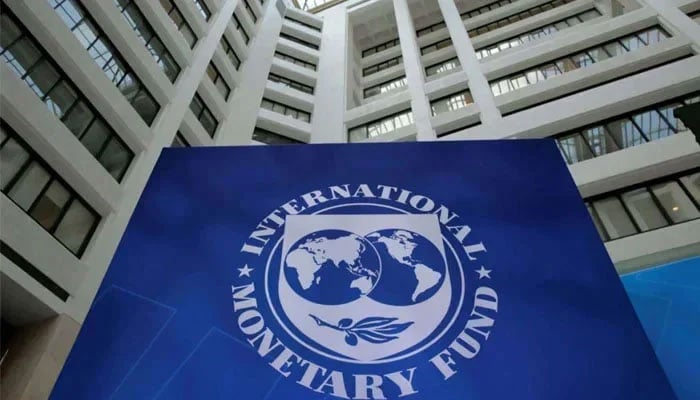
The International Monetary Fund’s (IMF) executive board will hold its meeting on April 29 to review the approval of $1.1 billion funding for Pakistan under the $3 billion Stand-By Arrangement (SBA), Reuters news agency quoted the global lender as saying on Wednesday.
Pakistan and the IMF reached a staff-level agreement on March 20, 2024, after holding review talks from March 14 to 19 in Islamabad for the release of the second and last tranche of the short-term deal.
Pakistan had secured the SBA, which expires this month, in June last year to avert the looming default.
The News reported last week that Pakistan made formal request to the IMF for seeking the next bailout package in the range of $6 to $8 billion under Extended Fund Facility (EFF) with the possibility of augmentation through climate financing.
However, the exact size and time frame will only be determined after evolving consensus on the major contours of the next programme in May 2024.
Pakistan has shown its interest and also made a request to dispatch the IMF review mission in May 2024 to firm up details of the next bailout package of three years period under EFF programme.
A day earlier, Minister for Finance and Revenue Muhammad Aurangzeb ruled out the possibility of any “Plan B” and made it clear Pakistan would go for the longer and larger size of the IMF programme to implement the long-awaited structural reforms.
“There is no Plan B. Government will go for the longer and larger size of IMF programme, and then will turn into execution mode to jack up tax-to-GDP ratio, fixing cash bleeding of the energy sector, bringing reforms into SOEs and privatising PIA and other loss-making entities,” the minister for finance said.
If secured, it would be the 24th IMF bailout for Pakistan.
Pakistan faces a chronic balance of payment crisis, with nearly $24 billion to repay in debt and interest over the next fiscal year — three time more than its central bank’s foreign currency reserves.
Pakistan’s finance ministry expects the economy to grow by 2.6% in the current fiscal year ending June, while average inflation is projected to stand at 24%, down from 29.2% in fiscal year 2023/2024.
Inflation soared to a record high of 38% last May.
FinMin Aurangzeb confident of reserves reaching $10bn by June
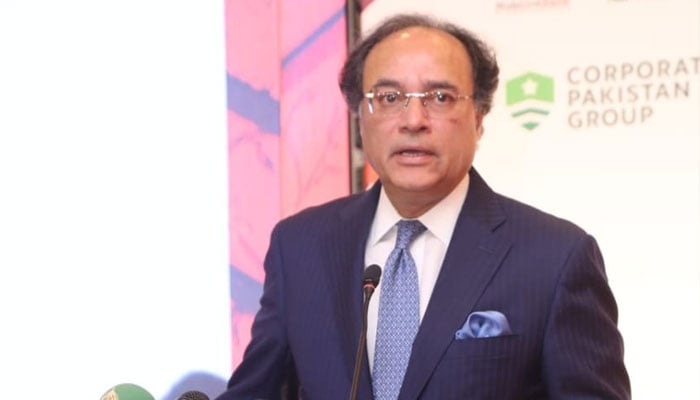
With the Shehbaz Sharif-led government striving to stabilise the country’s economy, Finance Minister Muhammad Aurangzeb Tuesday predicted positive economic developments including improved foreign exchange reserves in the ongoing fiscal year.
Addressing the 2024 Islamabad Business Summit, Aurangzeb said that the foreign exchange reserves witnessed an increase and will reach $10 billion by June this year.
He also stressed the need for reforms in the energy sector and highlighted the significance of the “essential” privatisation of loss-making enterprises.
On the issue of the country seeking another bailout programme from the International Monetary Fund (IMF), the finance czar termed it “crucial” and remarked that reaching out to the Washington-based lender is often the “last option” for a country.
His remarks come days after Islamabad made a formal request to the IMF for a new bailout package in the range of $6 to $8 billion under Extended Fund Facility (EFF) with the possibility of augmentation through climate financing.
In an interview with The National a day earlier, the FinMin noted that the IMF has been very receptive in terms of agreeing to consider a larger, longer programme.
However, the exact size and time-frame will only be determined after evolving consensus on the major contours of the next programme in May 2024.
Pakistan has shown its interest and also made a request to dispatch the IMF review mission in May 2024 to firm up details of the next bailout package of three years period under EFF programme.
Although, Pakistani authorities are pitching a rosy picture of the economy the IMF, in its latest Regional Economic Outlook (REO), released by the Middle East and Central Asia (ME&CA) department stated that Pakistan’s external buffers deteriorated, mostly reflecting ongoing debt service, including Eurobond repayments.
GDP growth to be 2.6% in 2024
On what the current fiscal year might look like for Pakistan, Aurangzeb said that the gross domestic product (GDP) growth is expected to be at 2.6% in FY2024.
The government is taking steps to attract foreign investment and has set targets to keep the current account and fiscal deficits within reasonable limits.
Recalling Islamabad’s efforts to rein in inflation, he highlighted that tax collection has increased due to government initiatives whereas there has been a reduction in the current account deficit (CAD) as well.
“The CAD has been reduced to $1 billion after a 74% reduction in the FY24,” the minister said, adding that the inflation is expected to remain at 24% during the ongoing fiscal year.
Whereas the trade deficit has also been slashed to $17 billion after a 24.9% reduction, he remarked.
“The country’s foreign exchange reserves have increased […] Pakistan stock market is at the highest level in history,” the minister noted.
“Steps have been taken to improve the performance of the agriculture sector [which has] a growth rate of 5%,” he added.
Commenting on the improved revenue generation, Aurangzeb said that the Federal Bureau of Revenue (FBR) has witnessed a significant 30.2% increase in its tax collection to surpass its Rs6.707 trillion target during the current fiscal year.
After Islamabad, Lahore and Karachi airports will also be privatised: FinMin Aurangzeb
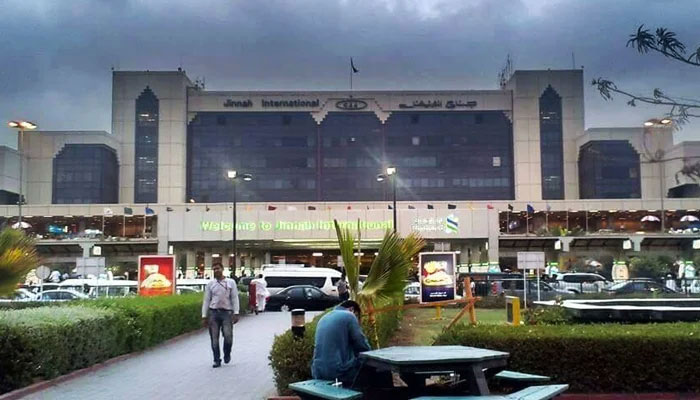
DUBAI: Finance Minister Muhammad Aurangzeb on Monday revealed that after the Islamabad International Airport, two more airports — Jinnah International Airport in Karachi and Allama Iqbal International Airport in Lahore — would also be privatised.
Addressing an event in Dubai, the finance czar said that talks are underway with Turkish and the Europium firms regarding privitisation of the Islamabad airport.
“Foreign exchange reserves will rise to $9-10 billion by June,” hopes finance minister

DUBAI: Finance Minister Muhammad Aurangzeb on Monday revealed that after the Islamabad International Airport, two more airports — Jinnah International Airport in Karachi and Allama Iqbal International Airport in Lahore — would also be privatised.
Addressing an event in Dubai, the finance czar said that talks are underway with Turkish and the Europium firms regarding privitisation of the Islamabad airport.
“The Pakistan International Airlines (PIA) will be privatised by July [2024].”
According to media reports, the newly elected government led by Prime Minister Shehbaz Sharif is under immense the International Monetary Fund’s (IMF) pressure to privatise loss-making public-sector entities. The privatisation of various public-sector companies is an integral part of the IMF’s conditions for a bailout package, suggests the report.
Finance Minister Aurangzeb said: “Economic initiatives are not related to any government but to the country.”
He announced that their effective measures to reduce the current account deficit were being fruits.
“Foreign exchange reserves will rise to $9-10 billion by June,” the finance minister hoped.
Referring to his recent talks with the officials of the World Bank, the federal minister said that the international lender was ready to support “Digital Pakistan” for 10 years.
Talking about the economic reforms, Aurangzeb said: “No amnesty scheme will be introduced now. People will have to pay taxes.”
The government was making international payments, adding that the “trust of global lenders has been restored”.
‘Pakistan on track to secure new IMF loan’
With macroeconomic factors shifting in Pakistan’s favour, the finance minister said that Islamabad is on track to secure a new loan from the International Monetary Fund (IMF) — the Washington-based lender.
In an interview with The National, the finance czar said: “The fund has been very receptive in terms of agreeing to consider a larger, longer programme.”
Pakistan has made a formal request to the IMF for another bailout package in the range of $6 to $8 billion under the Extended Fund Facility (EFF) with the possibility of augmentation through climate financing.
However, the exact size and time-frame will only be determined after evolving consensus on the major contours of the next programme in May 2024.
Aurangzeb told the Abu Dhabi-based publication that the macroeconomic factors are shifting in its favour as it works to boost its lagging economy.
The rupee has finally stabilised, he said, adding that the inflation is on track to drop to single-digit levels by the end of next year.
He further said that the cash-strapped nation would need at least three years of support to carry out a reform agenda across several sectors including taxation and energy.

